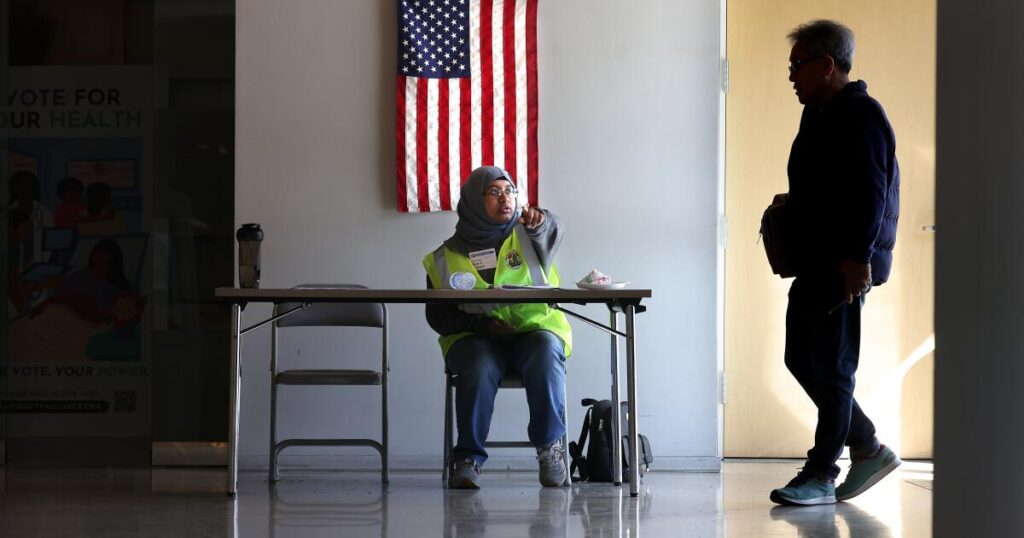[ad_1]

Election day is here and so too is the anxiety that has parked itself in the middle of the room.
Some people are trying their best to meet the moment — with mixed results — while others have simply chosen not to let the race for president and control of Congress dominate their lives.
For most of the voters we spoke to, it’s easier said than done.
Brothers David and Mark Aurigemma tried to drown out the election day noise with a walk through Los Angeles State Historic Park on Tuesday morning.
They planned to go for a hike and visit art galleries around downtown L.A. but admitted they were stressed about the election.
“We’re just sort of out walking around and trying to have a pleasant day and not think about it too much,” Mark said. “I think we’ll be glued to our TVs tonight to find out how the rest of our lives are gonna go.”
If you can’t stop the doomscrolling and worrying, you’re not alone. More than 7 in 10 adults (77%) report that the future of the U.S. is a significant source of stress in their lives, according to a recent report from the American Psychological Assn.
Nearly 70% of study respondents said they were stressed about this year’s election, a small uptick from 2020 when 68% of respondents reported being stressed but significantly more than in 2016, when it was 52%.
Anxiety can be loud, dominating our every waking moment — but only if we allow it, said Richard Cytowic, professor of neurology at George Washington University.
“The anxiety has nothing to do with the election and external factors,” Cytowic said. “It has everything to do with the individual.”
The news cycle delivers a steady drip of election information every hour, and it can be exhausting given that the U.S. campaign season has virtually encompassed the last two years, but Cytowic believes that all of this is manageable.
“Most people look at it like, ‘How can I manage this cacophony coming at me?’ Whereas I’m saying forget the cacophony,” he said. “My perspective is from the brain. What is it doing to us and how can I say no to this intrusion?”
One approach is to ignore the election altogether, like commercial truck driver Eddie Castaneda.
Castaneda, 36, was on a run around Los Angeles State Historic Park on Tuesday morning and said he had no plans on voting.
“I believe my vote don’t matter. … I’m not really big into politics,” Castaneda said. “Whoever wins, I’m going to sit back and watch it play out.”
Like a duck’s back, everything seems to roll off Castaneda. Despite seeing the news about AI automation and driverless vehicles such as Waymo, Castaneda isn’t worried about his job being eliminated. He drives a bobtail truck moving furniture across Southern California.
“I don’t think [my job] is going to go away,” he said. “Transportation is the one thing that keeps the world running. … We’re on the safe side.”
On the other side of that coin would be Kimberly Flores, 31, and her sister Luz Flores, 23, who were were waiting in line to order cupcakes at the Grove.
The pair aren’t eligible to vote and don’t feel safe under either potential administration, so they’ve elected to be generally nihilistic about the whole thing, while acknowledging it could affect their future.
“Deportations are still happening, no matter what party,” said Luz, who has legal status under the Dream Act.
The Flores sisters, it seems, are intent on staying calm under pressure. Such self-regulation is a sign of emotional intelligence, according to Cytowic, and a way of responding to stress rather than letting it control your behavior.
For Kelly Greaney and Stacey Matthew, who live near the Grove, their conduit to calm on Tuesday was catching an afternoon rom-com. Later they planned to try their best to make this as normal a day as possible — baking brownies, playing with their kids, cooking with family.
“I’m just trying to pass the time of anxiety, because in my mind, we have a full day of waiting and night of waiting for votes to be counted,” said Greaney, who was wearing an “I Voted” sticker.
The pair, who work in Hollywood, were headed into an early showing of the film “Anora” while their kids were at kindergarten. They became friends through their children — and said it had been stressful trying to explain elections to them.
Also, Matthew said, “I’m really afraid of civil unrest.”
Greaney, meanwhile, had been trying her best not to get stuck on watching the news. “I haven’t turned on the news today. I didn’t turn on the news last night,” she said. “I did go on social media, but I’ve averted a doomscroll.”
“One thing we know from psychology is that people really hate uncertainty and also hate a lack of control,” associate psychology professor Rodolfo Mendoza-Denton told UC Berkeley News. “Elections have both. You only have one vote. So there is a lot of anxiety.”
Not so much for Tom Rhodes, though.
“I’m feeling pretty zen,” Rhodes, 57, said of election day.
The full-time touring comedian had planned six months in advance to be home just so he could vote in person.
Rhodes was passing through the Grove on his way home with his “I Voted” sticker on his chest. “For me [Kamala Harris] has always been ahead,” he said.
The comedian said he’s a news junkie, and although he has tried to avoid obsessing over the news, he said he knew by nightfall he’d be looking for his news fix as the election results came in.
[ad_2]
Source link

